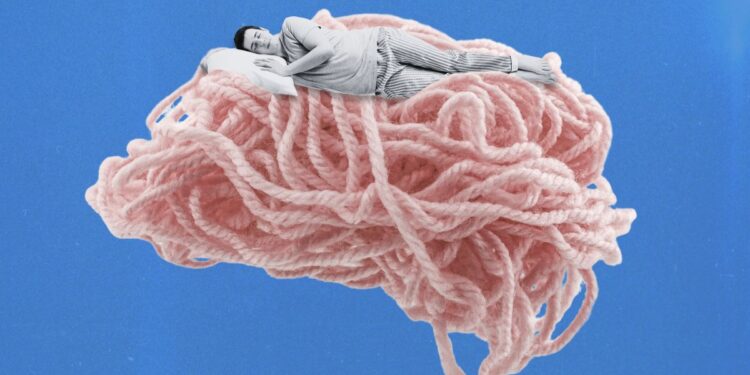The busy field that’s your mind is difficult at work all day lengthy—and it doesn’t give up whenever you’re asleep. Not solely does your mind fill your slumber with desires, it additionally goes proper on fixing the issues that plagued you in the course of the day, typically arising with options by the point you get up.
The concept of sleeping on an issue and seeing if you will get some readability within the morning is a typical one, however is it scientifically sound? A rising physique of analysis says sure.
The newest piece of proof that sleeping on an issue really works comes courtesy of a small examine just lately revealed within the Journal of Neuroscience. A bunch of 25 folks did a memorization job whereas wired as much as an electroencephalograph (EEG) and magnetoencephalography (MEG) so the researchers might monitor which parts of their brains lit up as they labored. Everybody then took a day nap, with mind sensors nonetheless in place.
The researchers had been in search of sleep spindles: bursts of exercise that happen within the mind throughout a comparatively mild stage of sleep. The situation of the spindles can present a clue as to what sort of data the mind is consolidating and processing at any explicit time.
Learn Extra: Why Do Some Individuals Want Extra Sleep Than Others?
Spindle exercise was particularly excessive in the identical areas of the mind that had been used within the memorization job, and the better the exercise, the extra folks improved on the job once they tried it after the nap. “Mind rhythms happen in every single place within the mind throughout sleep,” stated Dara Manoach, professor of psychiatry at Harvard College Medical Faculty and a coauthor of the examine, in a assertion that accompanied its launch. “However the rhythms in these areas enhance after studying, presumably to stabilize and improve reminiscence.”
Alyssa Sinclair, a postdoctoral fellow on the College of Pennsylvania, discovered one thing comparable in a examine revealed final yr. After sleeping on a troublesome job, folks had been extra level-headed the subsequent day. “Once we waited, once we allow them to sleep on it, they made considerably extra rational selections,” she says. “They had been now not fairly as drawn to evaluating occasions primarily based solely on their first impressions.”
This extra measured tackle issues is due largely to the area of the mind often known as the hippocampus, which is liable for processing short-term reminiscences and, throughout sleep, for serving to to find out which of these reminiscences can be transferred to long-term storage and which can basically be deleted.
“Once we’re asleep,” says Sinclair, “the hippocampus is difficult at work, consolidating these reminiscences and experiences from all through the day. It does this by replaying issues that had been necessary and pruning away the issues that weren’t.”
Learn Extra: The right way to Be Extra Spontaneous As a Busy Grownup
The hippocampus isn’t alone in dealing with this work. As soon as it’s achieved selecting probably the most related experiences, it transfers the keepers to the neocortex, the place long-term reminiscences are saved and built-in with current reminiscences. These two mind areas do extra than simply file or trash data. Additionally they analyze it—turning it this manner and that and making connections that will not have been completely apparent once we first encountered the knowledge. It’s throughout sleep that this course of typically takes place.
“Sleep is vital for problem-solving, creativity, and emotional regulation,” says Daniela Grimaldi, a analysis affiliate professor at Northwestern College’s Feinberg Faculty of Drugs. “Deep sleep, additionally known as slow-wave sleep…supplies the optimum situations for this reminiscence switch to happen effectively, making certain that necessary experiences and studying are preserved, whereas much less vital data is filtered out.”
“Your thoughts engages in informational alchemy,” says Matthew Walker, professor of neuroscience on the College of California, Berkeley, and the writer of the ebook Why We Sleep, “reassembling reminiscence fragments right into a novel set of associations and colliding them with the back-catalogue of saved data.”
Deep sleep isn’t the one part that performs a task in problem-solving and reminiscence consolidation. The lightest of the 4 phases of sleep, often known as N1 (for non-rapid eye motion stage one), may yield profound cognitive advantages. One 2023 examine in Science Advances discovered that when folks had been offered with a posh math downside, they tripled their possibilities of fixing it in the event that they spent as little as 15 seconds in N1 sleep after being uncovered to the issue.
“Our findings recommend that there’s a artistic candy spot inside the sleep-onset interval,” the researchers wrote, “and hitting it requires people balancing falling asleep simply in opposition to falling asleep too deeply.”
Learn Extra: An Alzheimer’s Blood Check Would possibly Predict Superior Illness
None of this means that the acutely aware thoughts is a secondary participant in studying and integrating and consolidating data. The cognitive muscle work of creativity—of artwork and scientific analysis and philosophical perception—is all performed by wide-awake thinkers. However when the lights go off and consciousness winks out, one other, deeper course of goes to work.
“Artistic downside fixing improves after a interval of sleep,” says Sinclair, “which helps us piece collectively these threads of what we’ve been fascinated by, filter out irrelevant data, and are available to a greater conclusion once we get up the subsequent day.”
It’s doable to enhance our possibilities of benefitting from all of that nocturnal work our brains are doing—if we all know how. “Dream reminiscences vanish quickly upon waking, making prompt recording essential,” says Walker. “Maintaining a dream journal or voice recorder bedside helps immensely. Upon waking, stay nonetheless with eyes closed for a second, permitting desires and insights to crystallize earlier than the calls for of each day life crowd them out. By creating this light routine, you improve your possibilities of retaining the options your sleeping mind—by its distinctive informational alchemy—has woven in a single day.”








Discussion about this post